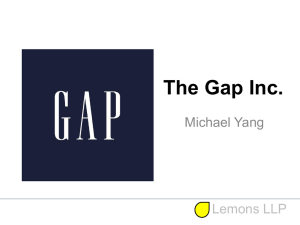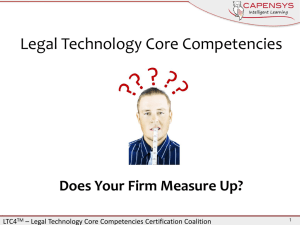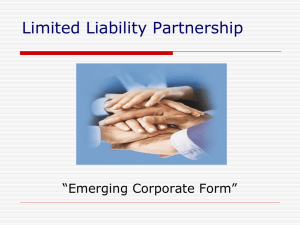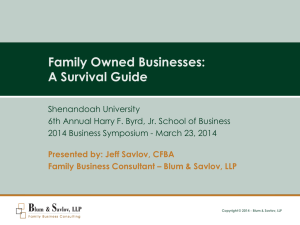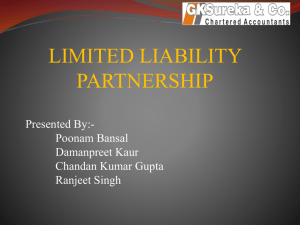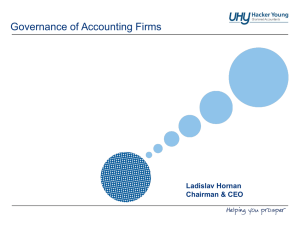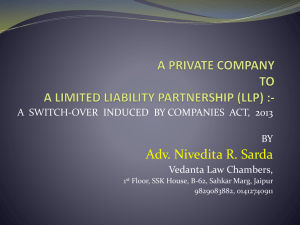ELA - Partnership Law for Employment Lawyers
advertisement
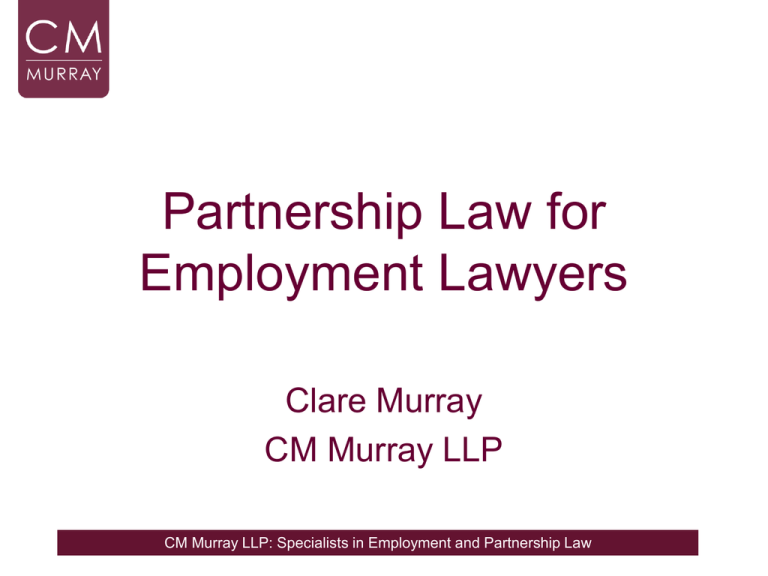
Partnership Law for Employment Lawyers Clare Murray CM Murray LLP CM Murray LLP: Specialists in Employment and Partnership Law Partnership Spoilers • General Partnerships and LLPs covered by separate bodies of law • In the absence of a partnership or LLP agreement certain default rules regulate individuals’ rights & duties • Fiduciary duties always apply to general partners but do not automatically apply to LLP Members or LLPs • Partner status requires assessment of parties’ intention and factual assessment against certain factors • There is no minimum threshold requirement for management involvement or profit sharing to be partner. CM Murray LLP: Specialists in Employment and Partnership Law Partnership Spoilers • LLP Members are not “workers” • Partner restrictive covenants are far more likely to be enforceable than employee restrictions • Arbitration clauses in Partnership Agreements are not effective to override tribunal jurisdiction • The concept of constructive dismissal is not available to partners in general partnerships, and is untested (and risky) in relation to LLPs CM Murray LLP: Specialists in Employment and Partnership Law General Partnerships Overview General Partnerships are regulated by: • Partnership Act 1890 • Express partnership agreement “Partnership is the relation which subsists between persons carrying on a business in common with a view of profit” s1(1) PA • No separate corporate entity, just a collection of two or more individuals in business together to make a profit CM Murray LLP: Specialists in Employment and Partnership Law General Partners’ Rights & Duties Each partner: –acts as agent for firm & other partners –owes fiduciary duties to the others –has joint and several personal liability –does not assume responsibility for pre-admission liabilities But an exiting partner remains responsible: – for liabilities incurred whilst a partner (subject to certain rights of indemnity) – for post-retirement liabilities until notice of change given to third parties who deal with firm, & in London Gazette CM Murray LLP: Specialists in Employment and Partnership Law General Partners’ Rights & Duties Duty of Good Faith is owed by each partner to the others in all partnership dealings and transactions Core fiduciary obligations of a partner are loyalty (fidelity) and good faith, incorporating: –The “Non-Conflict Duty” and –The “Not to Profit Duty”. “If fiduciary relation means anything I cannot conceive a stronger case of fiduciary relation that that which exists between partners.” V-C Bacon, Helmore v Smith (1887) CM Murray LLP: Specialists in Employment and Partnership Law General Partners’ Rights & Duties Common Law duty of Good faith is reinforced by PA 1890: –Each partner is bound to render true accounts and full information of all things affecting the firm to any partner or his legal adviser –Each partner is accountable to the firm for any benefit derived without other partners’ consent from any transaction concerning firm, its property, name or business connection –Each partner must not compete without the consent of firm whilst a partner, otherwise he is account for all unlawfully earned profits CM Murray LLP: Specialists in Employment and Partnership Law General Partners’ Rights & Duties Default rules which apply, in absence of agreement otherwise: • All partners share equally in capital and profits and contribute equally to losses of firm • Every partner can participate in management of firm • Changes to nature of business require unanimity; ordinary matters regarding firm business need a majority decision only • Every partner is entitled to have full access to, inspect and copy any of the partnership books CM Murray LLP: Specialists in Employment and Partnership Law General Partners’ Rights & Duties Right to dissolve a partnership at will by giving notice of dissolution to the other partners; no advance notice required. Partnership at will arises: – when no fixed term is agreed for partnership, or – it continues beyond expiry of fixed term, with no express new agreement or evidence of continuation on previous terms In practice they tend to occur where: • Partnership is set up without express written agreement; or • A new partner is admitted without agreeing to the partnership terms Dissolution can trigger winding up of the business CM Murray LLP: Specialists in Employment and Partnership Law General Partners’ Rights & Duties Right to petition Court for dissolution of Partnership under s35: • Partner is permanently incapable of performing partnership contract • Partner is guilty of conduct calculated to prejudicially affect the carrying on of the business • Partner wilfully / persistently commits a breach of partnership agreement, or otherwise conducts himself re partnership business so that it is not reasonably practicable to carry on in business with him • The business can only be carried on at a loss • Circumstances have arisen which, in opinion of the Court, render it just and equitable that the partnership be dissolved. CM Murray LLP: Specialists in Employment and Partnership Law LLP Overview An LLP is a corporate entity with its own separate legal existence Flexible internal ownership and governance structure LLP usually carries the duties and liabilities, contracts with third parties and usually owns the assets of the business LLPs are regulated, not by general partnership law (except in limited circumstances), but by: –Limited Liability Partnerships Act 2000, Limited Liability Partnerships Regulations 2001, and related LLP regulations –Certain parts of Companies Act 2006 and Insolvency Act 1986 (amongst other legislation) –The Members Agreement CM Murray LLP: Specialists in Employment and Partnership Law LLP Overview Designated Members: Responsibilities set out in CA and IA Ensure LLP disclosure/compliance obligations are fulfilled e.g. • filing of annual accounts, • appointing/removing auditors, • notification of changes in membership etc If in default Designated Members may be found guilty of an offence and liable to a fine. CM Murray LLP: Specialists in Employment and Partnership Law LLP Members’ Rights & Duties Default rules which apply in the absence of agreement otherwise, include • All Members share equally in capital and profits of firm • LLP must indemnify each Member regarding payments made and personal liabilities incurred: • In the ordinary and proper conduct of business • In or about anything necessarily done for preservation of LLP property or business. • Every Member can participate in the management of the LLP • Changes to nature of LLP business require unanimity; differences arising regarding ordinary matters in LLP business need majority decision only CM Murray LLP: Specialists in Employment and Partnership Law LLP Members’ Rights & Duties Key Default Rules (cont’d) • Every LLP Member is entitled to have full access to, inspect and copy any of the LLP books (Reg 7(7)) • Every Member must render true accounts and full information of all things affecting LLP to any Member or legal adviser (Reg 7(8)) • If any Member competes without the consent of the LLP whilst a Member, he must account for all unlawfully earned profits • Each Member is accountable to the LLP for any benefit derived without the LLP consent from any transaction concerning the LLP, or use of its property, name or business connection CM Murray LLP: Specialists in Employment and Partnership Law LLP Members’ Rights & Duties Expulsion, Resignation and Dissolution: No majority of Members can expel any Member unless power to do so has been conferred by express agreement (Reg 8) Voluntary retirement: • • in accordance with express provision or (in absence of agreement), by giving reasonable notice to other Members (NB. Legislation is silent on financial consequences of exit) Right to petition the Court to exercise its power to order winding up: • • under Court’s just and equitable discretion (s122(1)(e) IA 1986); or on basis LLP is unable to pay its debts (s122(1)(d). CM Murray LLP: Specialists in Employment and Partnership Law LLP Members’ Rights & Duties Are fiduciary duties owed between Members, to the LLP and by Senior Management to the LLP? Every Member is the agent of the LLP (s6(1) LLPA) His acts are attributed to and bind the LLP (except in certain circumstances or as otherwise agreed) When does he owe fiduciary duties to the LLP (beyond those set out in the Regulations - not compete without consent and not make secret profit)? CM Murray LLP: Specialists in Employment and Partnership Law F&C Alternative Investments (Holdings) Ltd v Barthelemy & Ors (2011) Contractual duty of utmost good faith – analogous to but not same as fiduciary duties. Extent of contractual duty of good faith depends on factual and contractual context Must have regard to legitimate interests of the LLP, but not obliged to act in interests of the LLP or subordinate/defer own legitimate interests to them Contractual duty of good faith embraces: • obligation to co-operate in achieving the contractual objectives; • Compliance with honest standards of conduct • Compliance with standards of conduct which are reasonable having regard to the interest of the parties “Dividing line” regarding duty to disclose in contractual duty of good faith CM Murray LLP: Specialists in Employment and Partnership Law F&C Alternative Investments (Holdings) Ltd v Barthelemy & Ors (2011) No automatic fiduciary duties owed between LLP Members “Fiduciary duties arise from particular circumstances, where a person assumes responsibility for the management of another’s property or affairs” Therefore where one has assumed to act in relation to the property or affairs of another, he comes under fiduciary duties to that other person The extent of the duties will depend on the particular case. CM Murray LLP: Specialists in Employment and Partnership Law F&C Alternative Investments (Holdings) Ltd v Barthelemy & Ors (2011) No general fiduciary duties automatically owed by Members to LLP beyond statutory duties of no competition without consent & no secret profit s.6 LLPA does not mean that members owe fiduciary duties to the LLP in everything they do. Look at “the specific roles and responsibilities arising in the particular context in question in order to assess whether and what fiduciary obligations may arise” None of the Members (in that capacity), had direct control over the affairs and property of the LLP or of each other in a manner which could to give rise to fiduciary duties CM Murray LLP: Specialists in Employment and Partnership Law F&C Alternative Investments (Holdings) Ltd v Barthelemy & Ors (2011) Fiduciary obligations of LLP Board Members/ Management etc to LLP? “ask what obligations of a fiduciary character may reasonably be expected to apply in the particular context, where the contract between the parties wil usually provide the major part of the contextual framework in which that questions arises” Consider the precise nature of the relation in question to determine the type of fiduciary oblations which apply. Contractual context may mean the parties could not reasonably expect fiduciary obligations should apply. When assessing Board member decisions, the Court will have regard to what Board Members genuinely thought to be in the best interests of the LLP CM Murray LLP: Specialists in Employment and Partnership Law Partner Status – Why status is important • A Fixed Share Partner (FS Partner) may in reality be an employee and have employment rights, resulting in the need to adopt formal consultation and grievance procedures • A genuine partner/Member will have rights to seek dissolution and participation in winding up of the business • Determining whether subject to duty of good faith or mutual trust and confidence • Restrictive covenants more likely to be enforceable against genuine partners than employees • Appropriate assessment for tax and NI CM Murray LLP: Specialists in Employment and Partnership Law Partner Status Measure the entire business relationship against s.1 PA 1890: “Partnership is the relation which subsists between persons carrying on a business in common with a view of profit” s.1(3) PA 1890: “The receipt...of a share of the profits of the business is prima facie evidence that he is a partner in the business but ..does not of itself make him a partner in the business..” CM Murray LLP: Specialists in Employment and Partnership Law Partner Status “..impossible to say …. a salaried partner is or is not necessarily a partner in the true sense. He may or may not be a partner depending on the facts….” “What must be done is to look at the substance of the relationship between the parties … and not..any mere label attached to that relationship.” “One must in every case look at the terms of the relationship to ascertain whether or not it creates a true partnership” Stekel v Ellice [1973] Megarry J CM Murray LLP: Specialists in Employment and Partnership Law Range of Factors Sharing in profits and losses v. Guaranteed pay Sharing in liabilities v. Indemnity against liabilities from Partners Capital Investment v. No capital requirement Participation in management v. Subject to control Ability to hire, fire & sign cheques v. No such rights Participation in assets on winding up of the Firm v. Held out as a partner, inc name on firm notepaper v. No participation Not held out as Partner CM Murray LLP: Specialists in Employment and Partnership Law Partner Status • Critical question – did they intend to create a partnership rather than another relationship? • All features of the agreement have to be considered to establish that intention • The absence of profit sharing, capital or dominant management rights does not undermine or negate other evidence of partnership CM Murray LLP: Specialists in Employment and Partnership Law LLP Members • S 4(4) Limited Liability Partnership Act 2000 “A member of a limited liability partnership shall not be regarded for any purpose as employed by the limited liability partnership unless, if he and the other members were partners in a partnership, he would be regarded for that purpose as employed by the partnership” • On the facts, would he have been regarded as a partner? • If not, on the facts would he have been an employee ? CM Murray LLP: Specialists in Employment and Partnership Law Tiffin v Lester Aldridge LLP (2012) • • • • • • • • • • • Solicitor employed by LA as an associate Promoted to salaried partner Appointed to fixed share partner as a stepping stone to equity Fixed profit share, plus 5 profit share points Capital contribution of £5,000 Signatory to bank accounts Issued with P45 Tax and NI as self-employed Signed Members Agreement on LLP conversion Entitled to participate in the winding up of the firm in proportion to his capital Certain voting rights, though not on all matters CM Murray LLP: Specialists in Employment and Partnership Law Tiffin v Lester Aldridge LLP (2012) Was served notice by the partnership Claim to ET for unfair dismissal, breach of contract and redundancy rejected – he was a partner, not employee Appealed to EAT on basis he believed he was in reality an employee as: • • • He was not involved in management of the firm, as FS Partners’ voting rights were “minimal” His share of profits and capital was too small The ET decision placed too much weight on labels rather than reality CM Murray LLP: Specialists in Employment and Partnership Law Tiffin v Lester Aldridge LLP (2012) EAT: There is no certain minimum number or types of rights to vote or to participate in management decisions to qualify as a partner “..in many large professional partnership, all but a few of the partners have any right to participate in the overwhelming range of decisions made by the firm and yet they are clearly partners” CM Murray LLP: Specialists in Employment and Partnership Law Tiffin v Lester Aldridge LLP (2012) Court of Appeal: He was a Partner, not an employee • No suggestion by Mr Tiffin that Members’ Agreement was a sham • Members’ Agreement reflected the parties’ intention to set up a partnership • There is no minimum threshold requirement for managerial involvement or amount of profit share • In fact FSPs did have a real voice in material aspects of the firm’s management by their (more limited) voting rights • Mr Tiffin contributed to the capital of the firm, took a share of the profits and had a voice in the management of the firm • He participated in surplus assets on a winding up CM Murray LLP: Specialists in Employment and Partnership Law Key Points to Remember • Each case turns on its own facts • Written terms not necessarily determinative - court will look at the whole picture and the reality of the relationship • Check whether written agreement is an accurate reflection of the relationship and intention of the parties, otherwise it runs the risk of being held to be a sham • When determining partner/employee status, certain key indicators will need to be present, and one factor alone is not determinative • Take tax advice • If there is doubt about whether an individual is an employee, be cautious and follow objective and fully documented selection and consultation processes before expulsion CM Murray LLP: Specialists in Employment and Partnership Law Other Protections for Partners Remember: • Partners and LLP Members are covered by discrimination protections • LLP Members are no longer covered by Whistle blowing protections (Court of Appeal Clyde & Co & Morris v Bates Van Winkelhof ) CM Murray LLP: Specialists in Employment and Partnership Law Clyde & Co & Morris v Bates Van Winkelhof ET: Claimant not a worker & could not pursue whistle blowing claim S230 (3) ERA: Worker means an individual who entered into or works/worked under : “a) a contract of employment, or b) any other contract, whether express of implied and (if it is express) whether oral or in writing, whereby the individual undertakes to do or perform personally any work or services for another party to the contract whose status is not by virtue of the contract that of a client or customer of any profession or business undertaking carried on by the individual” ET: Claimant was in business in her own right, receiving a share of profit for work carried out and did not satisfy limb b) of definition The LLP as other party to contract, was a client or customer of the business/profession carried on by her CM Murray LLP: Specialists in Employment and Partnership Law Clyde & Co & Morris v Bates Van Winkelhof EAT: ET decision overturned - Claimant was a worker & could pursue whistle blowing claim Claimant was in a subordinate position within the Firm It was impossible to describe the LLP as her client or customer She therefore fell within limb b) definition of worker Firm appealed: 1) Claimant was not in a subordinate position 2) She could not have been a worker because of s4(4) LLPA 2000 regarding employment status or otherwise of Members CM Murray LLP: Specialists in Employment and Partnership Law Clyde & Co & Morris v Bates Van Winkelhof Court of Appeal: Claimant not a worker & could not pursue whistle blowing claim A member of a limited liability partnership shall not be regarded for any purpose as employed by the limited liability partnership unless, if he and the other members were partners in a partnership, he would be regarded for that purpose as employed by the partnership”. S4(4) LLPA 2000: CoA: Claimant would have been a partner if this had been a partnership Court preferred wider view that “employed by the limited liability partnership” meant both employees and limb b) workers Central question then - whether gen. partnership partners could be limb b) workers Clear authority that such a partner could not be a worker: • traditional partnership is not a separate legal entity • No subordinate relationship in a general partnership – service and control lacking CM Murray LLP: Specialists in Employment and Partnership Law Partner Restrictive Covenants As with employees, partner restrictive covenants are void unless they are: • reasonable in the interests of the parties • reasonable in the interests of the public • necessary to protect a legitimate business interest • no more than is reasonably necessary between the parties to protect that interest But separate body of law has developed regarding partnership restrictive covenants CM Murray LLP: Specialists in Employment and Partnership Law Partner Restrictive Covenants Bridge v Deacons [1984] Judicial Committee of Privy Council • Capital Partner with 5% interest in business and assets of firm • Little exposure to clients outside IP and TM dept • Prohibition on acting as a solicitor in HK for 5 years for any client of the firm or any client within 3 years prior to departure • On departure, he received substantial payment (though only nominal amount for good will), set up in competition and acted for prohibited clients • Firm sought injunction to enforce restrictive covenant CM Murray LLP: Specialists in Employment and Partnership Law Bridge v Deacons [1984] Bridge argued: 1) Scope unreasonable as it prevented him acting for 90% of firm’s clients with whom he had no connection/dealings 2) He received only a nominal amount for goodwill and therefore firm not entitled to protect it by a restrictive covenant 3) 5 year duration was unreasonable. CM Murray LLP: Specialists in Employment and Partnership Law Bridge v Deacons [1984] Held: 1) Having regard to value of business and defendant’s position, scope and duration were not unreasonable. 2) Firm was a single practice in which all partners had an interest, shared profits and losses, and owned the assets. 3) The restrictive covenant was mutual – all partners were bound by and benefited from it. 4) He had benefit of the goodwill whilst a partner, which firm now sought to protect; transfer of goodwill was not by way of a cash sale but under partnership terms under which he had only paid a nominal amount when he first joined the firm. 5) The partners were of equal bargaining power (and also lawyers!) CM Murray LLP: Specialists in Employment and Partnership Law Clare Murray CM Murray LLP 37th Floor Canary Wharf, London, E14 5AA England DD: 0207 718 0090 FAX: 0207 718 0091 E: clare.murray@cm-murray.com @cmmurrayllp @ClareMary CM Murray LLP: Specialists in Employment and Partnership Law
